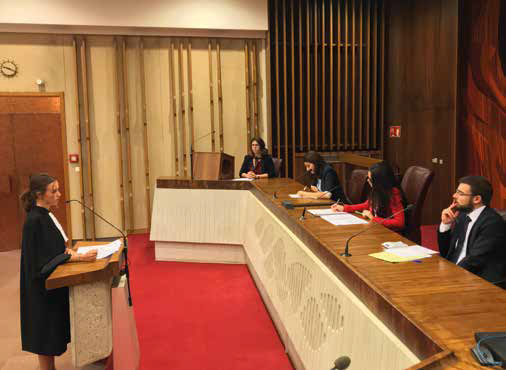The Cyber Law Clinic probes digital technologies
To measure the impact of current and future technological transformations on rights and freedoms, the students of the Law School are conducting experiments in law clinics.
updated on 28 January 2020
UCLy
Today's students will be the driving force behind the technological transformations of the future, which is why it is so important for them to study these new issues now.
These transformations raise multiple questions in terms of rights and freedoms: respect for privacy, the protection of personal data regarding to connected objects (companion robots, driverless vehicles), the dignity of the individual (dependence, loss of decision-making power), but also freedom of expression (automated censorship by algorithms, monopoly position of the tech giants, manipulating of public opinion and risk of uniformity of thought). Another key legal point is the issue of responsibility.
Research, both fundamental and applied, seeks potential answers to these points of law, both in terms of recommendations and training of future generations of practitioners. This is why the UCLy Law School has decided to develop experimental law clinics, in partnership with the Administrative Court of Appeal of Lyon, the bar association and industrial companies such as Transpolis and Volvo-Renault Trucks and the engineering school INSA.
Mock trials and innovative solutions
The law clinics are part of an innovative teaching strategy offering students the opportunity to play the role of practitioners drafting legal documents, such as petitions, statements of case, conclusions, judgements and articles, with mock trials organised under real conditions.

They help students become familiar with the multidisciplinary nature of the professional world in which they will put their abilities and skills to use. The students are supported and guided in their work by legal professionals (lawyers and judges), as well as technical experts (engineering students and industrial companies). As part of this process, they are required to develop an originalskillset, outside the core curriculum, by drafting realistic legal rules and finding workable solutions to digital technologies.
An open-access dedicated platform
The law clinics also take a modern open approach, focusing on sharing, thanks to an open-access web-based platform developed by the teaching team and the communications manager of the UCLy Law School. An efficient way of disseminating the knowledge gained through the work, and of recruiting new partners.
The platform will present all of the documents relating to the clinics: legal intelligence, mock trial documents, research results, scientific documents on the new technologies studied and course content on litigation and the drafting of legal documents. The aim is to ensure the transferability of the skills acquired and of the legal solutions analysed by the students.
"Today's students will be the driving force behind the technological transformations of the future."
Associated legal professionals and scientists
These clinics foster the students’ socioeducational and personal development by increasing their awareness of the impact of digital technologies on their future work environment and on society. They will learn to communicate and collaborate with people outside the legal profession to contribute to the societal debate surrounding these technologies.
Through cross-sector and multidisciplinary partnerships, the exchange of expertise between legal professionals and scientists will help identify the legal issues involved in technological projects and give legal professionals a solid grounding for the future. This will serve to enhance the civic and social responsibility of students, researchers and universities.
"The law clinics are part of an innovative teaching strategy offering students the opportunity to play the role of practitioners drafting legal documents, with mock trials organised under real conditions."
Preparing for a career
By offering students the opportunity to assume the role of a lawyer or judge, the clinics give them insight into their future career. The aim is to help them better plan their university studies and set their career goals, while developing new technical skills and professional capabilities: teamwork, interdisciplinay work, understanding the role of legal professionals in collaboration with the business community, creating new norms and, finally, discovering academic research.
Especially for students who may lack pertinent contacts in the field, this experience gives them a boost by allowing them to work with professionals.
"Research, both fundamental and applied, seeks potential answers to these points of law, both in terms of recommendations and training of future generations of practitioners."
AN INTERNATIONAL ACADEMIC PARTNERSHIP
Since the beginning of the academic year 2018-2019, the teaching team in charge of the project has been helping the law clinics create networks with foreign partners. A consortium was created in early 2019 with the Netherlands, Italy, Poland and France as part of a project under the Erasmus+ programme. This international academic partnership will make it possible to test identical issues across separate legal systems. The goal is to determine the common denominators and then to make recommendations, after a Spring School attended by all of the participants. This partnership should prove extremely useful, given the prospect of a future European regulation aimed at enabling Europe to weigh in discussions currently dominated by US and Chinese interests.